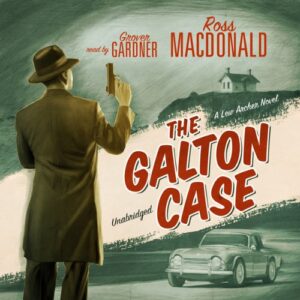The Galton Case—Something Very Special

Macdonald wisely described The Galton Case as “a breakthrough book.” As commentators have noted, the addition of the article showed a recognition that, no matter how important the book was, it was still only a step towards his full artistic maturity. Opinions differ on whether it’s his best book but all agree that it’s one of his great ones.
As followers of this blog know, I usually start by sampling a half dozen commentators. But except for Peter Wolfe, my usual team has less to say than usual. Not to worry. In 1973 Macdonald published On Crime Writing, a book containing two essays, one of which was, “Writing The Galton Case.” Not only does it stand as a detailed commentary on the work, but it was written ten years later, with the virtues of hindsight.
You may be surprised to know that The Galton Case didn’t begin as a mystery at all. Macdonald wrote two fragments (Speir says three) of failed, grim, naturalistic novels in the spirit of the abandoned novel of his childhood, Winter Solstice, five years before. None of the fragments ran more than thirty pages and all suffered from the defect that the voice of the protagonist, a teenaged boy, simply could not carry the nuance and complexity of the story. If was only when Macdonald came up with the idea of using Archer’s investigation of the boy’s story as a framing device did The Galton Case truly begin to take shape.
“Writing The Galton Case” is elegantly crafted and deserves to be read in full. But consideration of space and the limitations of fair use under copyright law restricts me to quoting his most important observations.
- “The literary detective has provided writers since Poe with a disguise, a kind of welder’s mask enabling him to handle dangerously hot material.”
- “Disguise is the imaginative device which permits the work to be both public and private, to half-divulge the writer’s crucial secrets while deepening the whole community’s sense of its own mysterious life.”
- “My mind had been haunted for years by an imaginary boy whom I recognized as the darker side of my own remembered boyhood. By his sixteenth year he had lived in fifty houses and committed the sin of poverty in each of them. I could not think of him without anguish and guilt.”
- “The Castle and the Poorhouse [an early proposed title] . . . accurately reflects the vision of the world that my adult imagination inherited from my childhood. It was a world profoundly divided, between the rich and the poor, the upright and the downcast, the sheep and the goats. We goats knew the moral pain inflicted not so much by poverty as by the doctrine, still current, that poverty is always deserved.”
- “Perhaps I have encouraged the reader to identify this boy with me. If so, I must qualify this notion . . . My nature is probably better represented by the whole book than by any one of its characters.”
- A breakthrough . . . came with my decision to use the detective Archer as the narrator. This may seem a small matter, but it was not . . . With this decision I made up my mind that the convention of the detective novel, in which I had been working for fifteen years, would be able to contain the material of my most ambitious and personal work so far. I doubt that my book could have been written in any other form.”
(Emphasis added)
The reader is invited to sit down with their beverage of choice and consider these lines. Macdonald did not conceive this book as a detective story at all during his early drafts. The book was to be an autobiographical literary novel, struggling over the same slippery and muddy battlefield of his abandoned novel, Winter Solstice. If The Galton Case doesn’t read quite like a conventional mystery, if it seems that too much happens outside of Archer’s presence and without any agency on his part, here is your explanation. The traces of a traditional literary novel are there if you know where to look. The last line quoted above is his recognition of why The Galton Case succeeded when Winter Solstice failed, despite the similarity in subject
Macdonald’s most famous description of Archer has been mentioned several times already, and I would be remiss if I did not set it in context:
- “As I write a book . . . my ego is dispersed through several characters . . . Certainly my narrator Archer is not the main object of my interest, nor the character with whose fate I am most concerned. He is a deliberately narrowed version of the writing self, so narrow that when he turns sideways he almost disappears. Yet his semi-transparent presence places the story at one remove from the author and lets it, as we say (through sweat and tears) write itself.”
(Emphasis added)
Let’s see what the commentators have to say before we jump into the text.
Recent Comments